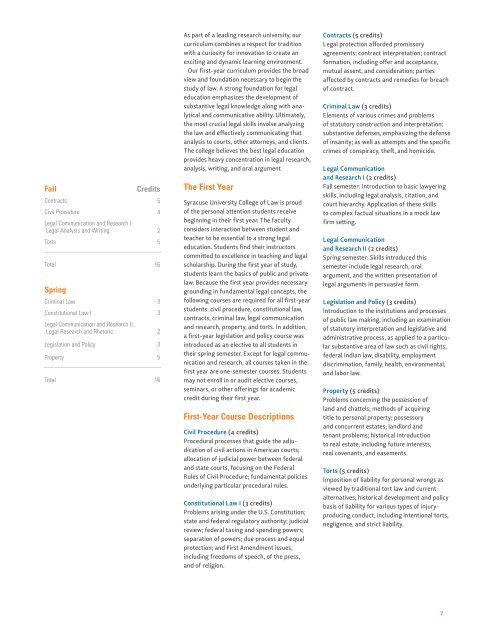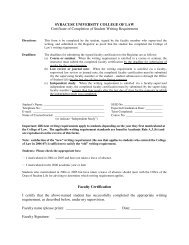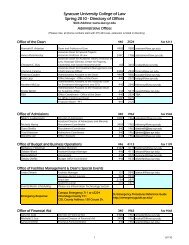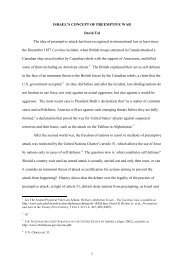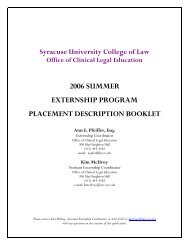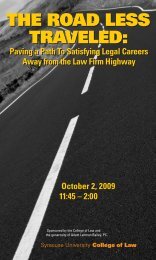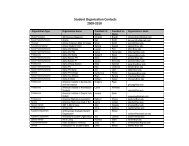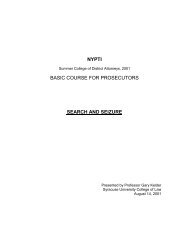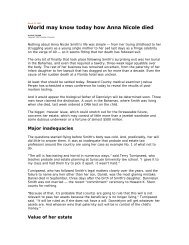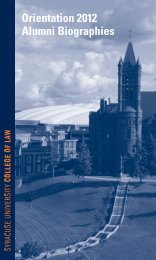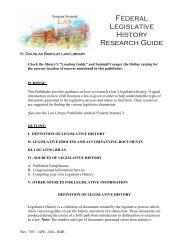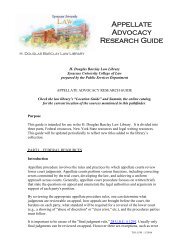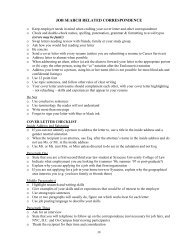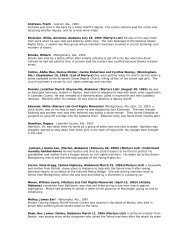CATALOG 2006-2007 - Syracuse University College of Law
CATALOG 2006-2007 - Syracuse University College of Law
CATALOG 2006-2007 - Syracuse University College of Law
You also want an ePaper? Increase the reach of your titles
YUMPU automatically turns print PDFs into web optimized ePapers that Google loves.
Fall<br />
Credits<br />
Contracts<br />
5<br />
Civil Procedure<br />
Legal Communication and Research I:<br />
4<br />
Legal Analysis and Writing<br />
2<br />
Torts<br />
5<br />
Total<br />
Spring<br />
Criminal <strong>Law</strong><br />
Constitutional <strong>Law</strong> I<br />
Legal Communication and Research II:<br />
Legal Research and Rhetoric<br />
Legislation and Policy<br />
Property<br />
Total<br />
16<br />
3<br />
3<br />
2<br />
3<br />
5<br />
16<br />
As part <strong>of</strong> a leading research university, our<br />
curriculum combines a respect for tradition<br />
with a curiosity for innovation to create an<br />
exciting and dynamic learning environment.<br />
Our first-year curriculum provides the broad<br />
view and foundation necessary to begin the<br />
study <strong>of</strong> law. A strong foundation for legal<br />
education emphasizes the development <strong>of</strong><br />
substantive legal knowledge along with analytical<br />
and communicative ability. Ultimately,<br />
the most crucial legal skills involve analyzing<br />
the law and effectively communicating that<br />
analysis to courts, other attorneys, and clients.<br />
The college believes the best legal education<br />
provides heavy concentration in legal research,<br />
analysis, writing, and oral argument<br />
The First Year<br />
<strong>Syracuse</strong> <strong>University</strong> <strong>College</strong> <strong>of</strong> <strong>Law</strong> is proud<br />
<strong>of</strong> the personal attention students receive<br />
beginning in their first year. The faculty<br />
considers interaction between student and<br />
teacher to be essential to a strong legal<br />
education. Students find their instructors<br />
committed to excellence in teaching and legal<br />
scholarship. During the first year <strong>of</strong> study,<br />
students learn the basics <strong>of</strong> public and private<br />
law. Because the first year provides necessary<br />
grounding in fundamental legal concepts, the<br />
following courses are required for all first-year<br />
students: civil procedure, constitutional law,<br />
contracts, criminal law, legal communication<br />
and research, property, and torts. In addition,<br />
a first-year legislation and policy course was<br />
introduced as an elective to all students in<br />
their spring semester. Except for legal communication<br />
and research, all courses taken in the<br />
first year are one-semester courses. Students<br />
may not enroll in or audit elective courses,<br />
seminars, or other <strong>of</strong>ferings for academic<br />
credit during their first year.<br />
First-Year Course Descriptions<br />
Civil Procedure (4 credits)<br />
Procedural processes that guide the adjudication<br />
<strong>of</strong> civil actions in American courts;<br />
allocation <strong>of</strong> judicial power between federal<br />
and state courts, focusing on the Federal<br />
Rules <strong>of</strong> Civil Procedure; fundamental policies<br />
underlying particular procedural rules.<br />
Constitutional <strong>Law</strong> I (3 credits)<br />
Problems arising under the U.S. Constitution;<br />
state and federal regulatory authority; judicial<br />
review; federal taxing and spending powers;<br />
separation <strong>of</strong> powers; due process and equal<br />
protection; and First Amendment issues,<br />
including freedoms <strong>of</strong> speech, <strong>of</strong> the press,<br />
and <strong>of</strong> religion.<br />
Contracts (5 credits)<br />
Legal protection afforded promissory<br />
agreements; contract interpretation; contract<br />
formation, including <strong>of</strong>fer and acceptance,<br />
mutual assent, and consideration; parties<br />
affected by contracts and remedies for breach<br />
<strong>of</strong> contract.<br />
Criminal <strong>Law</strong> (3 credits)<br />
Elements <strong>of</strong> various crimes and problems<br />
<strong>of</strong> statutory construction and interpretation;<br />
substantive defenses, emphasizing the defense<br />
<strong>of</strong> insanity; as well as attempts and the specific<br />
crimes <strong>of</strong> conspiracy, theft, and homicide.<br />
Legal Communication<br />
and Research I (2 credits)<br />
Fall semester: Introduction to basic lawyering<br />
skills, including legal analysis, citation, and<br />
court hierarchy. Application <strong>of</strong> these skills<br />
to complex factual situations in a mock law<br />
firm setting.<br />
Legal Communication<br />
and Research II (2 credits)<br />
Spring semester: Skills introduced this<br />
semester include legal research, oral<br />
argument, and the written presentation <strong>of</strong><br />
legal arguments in persuasive form.<br />
Legislation and Policy (3 credits)<br />
Introduction to the institutions and processes<br />
<strong>of</strong> public law making, including an examination<br />
<strong>of</strong> statutory interpretation and legislative and<br />
administrative process, as applied to a particular<br />
substantive area <strong>of</strong> law such as civil rights,<br />
federal Indian law, disability, employment<br />
discrimination, family, health, environmental,<br />
and labor law.<br />
Property (5 credits)<br />
Problems concerning the possession <strong>of</strong><br />
land and chattels; methods <strong>of</strong> acquiring<br />
title to personal property; possessory<br />
and concurrent estates; landlord and<br />
tenant problems; historical introduction<br />
to real estate, including future interests,<br />
real covenants, and easements.<br />
Torts (5 credits)<br />
Imposition <strong>of</strong> liability for personal wrongs as<br />
viewed by traditional tort law and current<br />
alternatives; historical development and policy<br />
basis <strong>of</strong> liability for various types <strong>of</strong> injuryproducing<br />
conduct, including intentional torts,<br />
negligence, and strict liability.<br />
7


